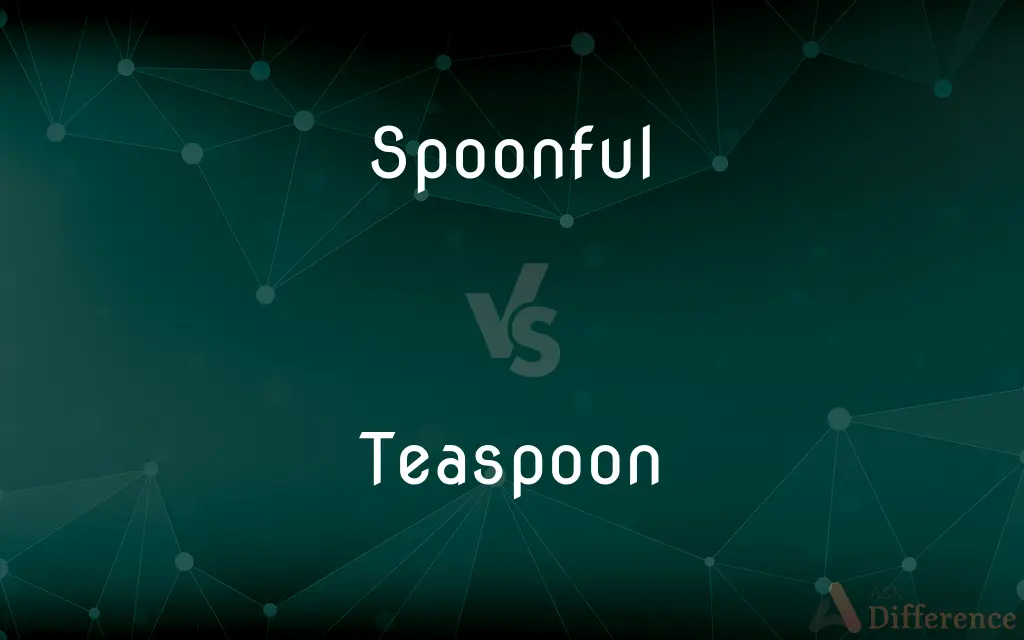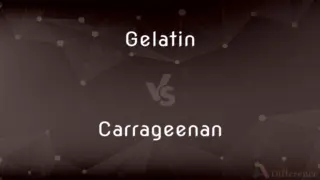Spoonful vs. Teaspoon — What's the Difference?
By Maham Liaqat & Urooj Arif — Updated on April 28, 2024
A spoonful is a generic term for the amount held by a spoon, whereas a teaspoon specifically measures about 5 milliliters.

Difference Between Spoonful and Teaspoon
Table of Contents
ADVERTISEMENT
Key Differences
A spoonful refers to the amount that can be scooped up with any spoon—be it a teaspoon, tablespoon, or even a serving spoon. In contrast, a teaspoon is a specific measurement unit used primarily in cooking to measure volume, equivalent to 5 milliliters or about 1/6th of a fluid ounce.
When someone says "spoonful," the actual volume can vary significantly based on the spoon used and how much the spoon is filled. However, using "teaspoon" indicates a precise amount, which is crucial for recipes where exact quantities of ingredients are necessary for the desired outcome.
The term spoonful is often used more informally and can be applied to both liquid and solid substances, depending on the context. A teaspoon, by its very nature as a unit of measurement, is used formally and specifically in contexts requiring precision, such as in medicine or cooking.
While any spoon can provide a spoonful, teaspoons are specifically designed and standardized to ensure they hold the same volume, making them reliable tools for measuring ingredients accurately. This standardization is absent in the general use of spoonfuls.
Spoonfuls are more about the convenience of measurement without needing precise tools, suitable for everyday language and non-critical measurements. On the other hand, teaspoons are essential in scenarios where precision impacts the quality or success of a task, such as in baking.
ADVERTISEMENT
Comparison Chart
Definition
Amount held by any spoon.
A specific measure of about 5 milliliters.
Variability
Varies with the spoon's size and shape.
Standardized and precise.
Usage Context
Informal, general use.
Formal, used in cooking and medicine.
Measurement Focus
Convenience without precision.
Precision necessary for specific tasks.
Application
Any substance, solid or liquid.
Mainly liquids and fine powders.
Compare with Definitions
Spoonful
Often used in everyday language.
A spoonful of medicine helps the taste go down.
Teaspoon
Holds about 5 milliliters of a liquid.
She measured three teaspoons of water.
Spoonful
The amount a spoon can contain.
He added a spoonful of sugar to his coffee.
Teaspoon
Often used in medicine to measure doses.
The child's medication dosage was 2 teaspoons daily.
Spoonful
Can refer to different types of spoons.
A spoonful with a serving spoon is much more than with a teaspoon.
Teaspoon
Standardized for accuracy in recipes.
Use a teaspoon of baking powder to ensure the cake rises properly.
Spoonful
Implies an easy and accessible way of measuring.
Just add a spoonful of honey to sweeten the sauce.
Teaspoon
A precise unit of measurement in cooking.
The recipe called for one teaspoon of vanilla extract.
Spoonful
Used to describe a non-specific quantity.
She took a spoonful of the mixture to taste it.
Teaspoon
Specifically refers to a small spoon in utensil sets.
Stir your tea with a teaspoon to dissolve the sugar.
Spoonful
"Spoonful" is a blues song written by Willie Dixon and first recorded in 1960 by Howlin' Wolf. Called "a stark and haunting work", it is one of Dixon's best known and most interpreted songs.
Teaspoon
A teaspoon (tsp.) is an item of cutlery. It is a small spoon that can be used to stir a cup of tea or coffee, or as a tool for measuring volume.
Spoonful
The amount that a spoon holds.
Teaspoon
The common small spoon used especially in serving and consuming tea, coffee, and desserts.
Spoonful
The amount that a spoon will hold, either level or heaped.
Teaspoon
Abbr. t or tsp. A household cooking measure equal to 1/3 tablespoon (about 5 milliliters). See Table at measurement.
Spoonful
The quantity which a spoon contains, or is able to contain; as, a teaspoonful; a tablespoonful.
Teaspoon
A small spoon used to stir the contents of a cup or glass.
Spoonful
Hence, a small quantity.
Teaspoon
A unit of measure, equivalent to one-third of a tablespoon or roughly five milliliters.
Spoonful
As much as a spoon will hold;
He added two spoons of sugar
Teaspoon
To serve with a teaspoon
I teaspooned some sugar into my cup.
Teaspoon
A small spoon used in stirring and sipping tea, coffee, etc., and for other purposes.
Teaspoon
Same as teaspoonful.
Teaspoon
A small spoon used for stirring tea or coffee; holds about one fluid dram
Teaspoon
As much as a teaspoon will hold
Common Curiosities
Can I use a teaspoon for dry ingredients?
Yes, teaspoons are commonly used for both dry and liquid ingredients in cooking.
Why use a teaspoon instead of a spoonful in recipes?
A teaspoon ensures precision, which is crucial for the chemical reactions in cooking and baking.
Are there different types of teaspoons?
Yes, there are slight variations like dessert spoons and coffee spoons, but they are close in size.
What is a spoonful in teaspoons?
It can vary, but typically a spoonful is roughly equivalent to the amount in one to three teaspoons, depending on the spoon.
How accurate is a spoonful?
A spoonful is not a precise measure and can vary based on the spoon's size.
What are common mistakes when measuring with a teaspoon?
Not leveling off the spoon for dry ingredients can lead to inaccurate measurements.
Is a teaspoon always 5 milliliters?
Yes, in cooking and medicine, a teaspoon is standardized to approximately 5 milliliters.
How do I convert teaspoons to tablespoons?
Three teaspoons make up one tablespoon.
Can measuring inaccurately affect a recipe?
Yes, especially in baking, where precise ratios are crucial for the desired outcome.
Why might someone prefer to use "spoonful" instead of "teaspoon"?
"Spoonful" is less formal and quicker for everyday, non-critical tasks.
Share Your Discovery

Previous Comparison
Having vs. Haven
Next Comparison
Gelatin vs. CarrageenanAuthor Spotlight
Written by
Maham LiaqatCo-written by
Urooj ArifUrooj is a skilled content writer at Ask Difference, known for her exceptional ability to simplify complex topics into engaging and informative content. With a passion for research and a flair for clear, concise writing, she consistently delivers articles that resonate with our diverse audience.
















































